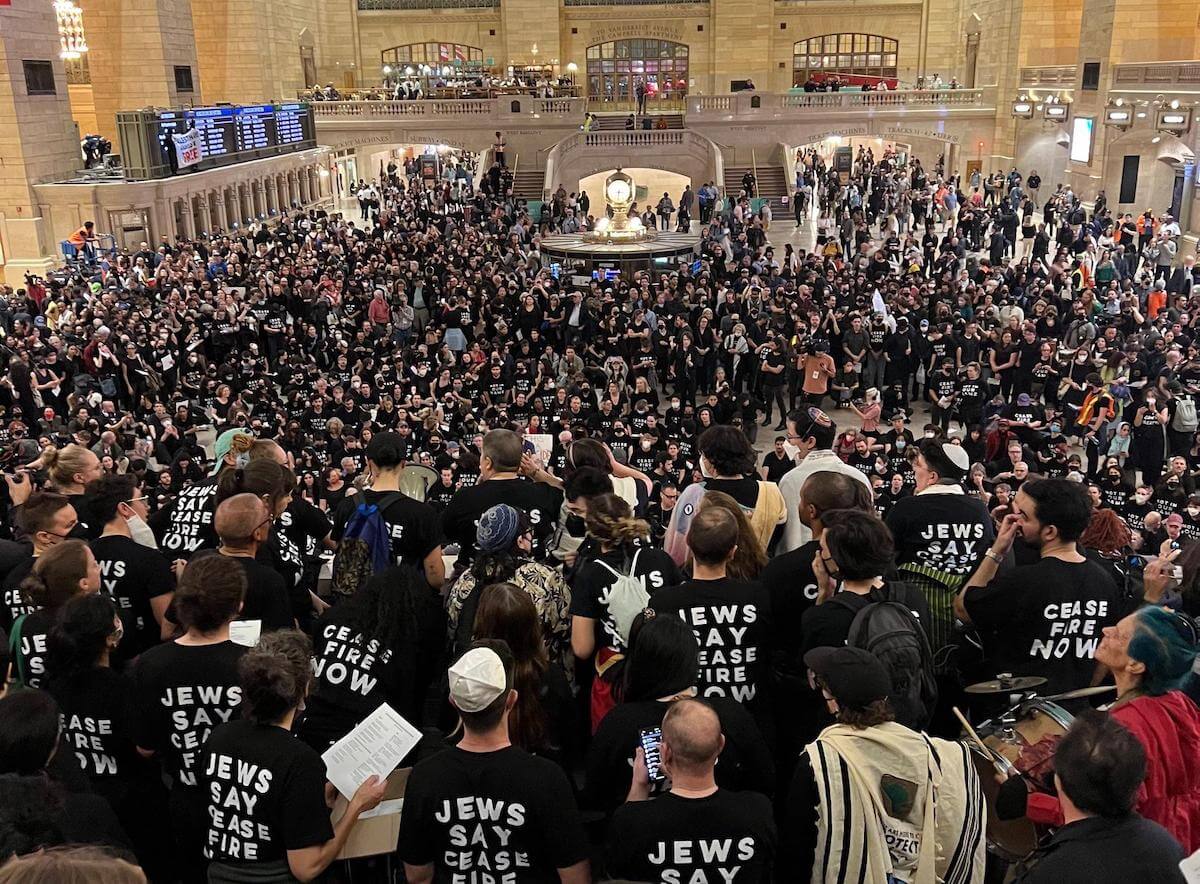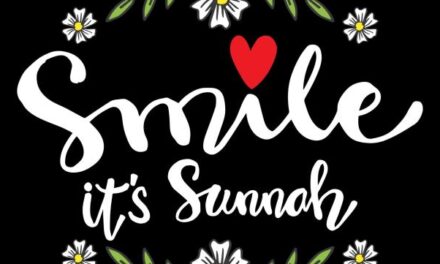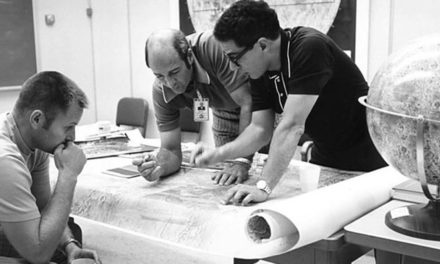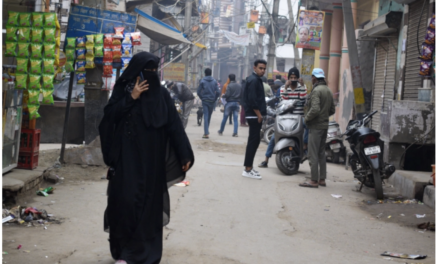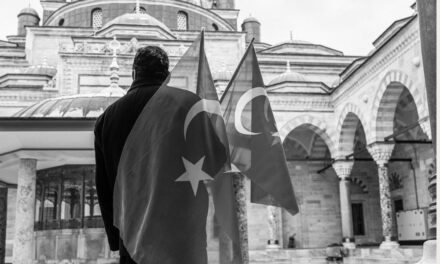Over 300 Jewish New Yorkers were arrested at Grand Central calling for a ceasefire in the largest civil disobedience NYC has seen in 20 years. (Photo: Jewish Voice for Peace)
Over the last ten months we’ve seen Jewish activists and political groups organize hundreds of protests in support of Gaza.
At the forefront of those efforts has been the group Jewish Voice for Peace (JVP), which was established in 1996 by three UC Berkeley undergrads as an all-volunteer Jewish peace group and has evolved into an anti-Zionist, BDS-supporting organization with tens of thousands of members.
In their new book Solidarity Is the Political Version of Love: Lessons from Jewish Anti-Zionist Organizing two former JVP leaders—Rebecca Vilkomerson and Rabbi Alissa Wise—reflect on their time with the organization and talk about the role of anti-Zionist Jewish organizing within the Palestine solidarity movement.
“Solidarity is the Political Version of Love provides that for us with biting nuance and tender self-reflection in regards to the transformation of Jewish Voice for Peace from a local anti-occupation Jewish organization into an international anti-Zionist Jewish organization leading a revival of Jewish leftist traditions,” says attorney and author Noura Erakat. “Situating themselves both within and adjacent to the organization, Rebecca Vilkomerson and Rabbi Alissa Wise have offered an enduring historical document for generations of anti-Zionist Jewish organizers to come.”
Mondoweiss spoke with co-author Rebecca Vilkomerson about the book, the evolution of JVP, and the state of anti-Zionist organizing amid the ongoing genocide in Gaza.
Mondoweiss: The book focuses on this period from 2010 to 2020 when you and your co-author Alissa Wise worked at Jewish Voice for Peace (JVP). Can you talk about what prompted the organization’s leftward shift and how it came to recalibrate its relationship with the issue of Palestine?
Rebecca Vilkomerson: I was a member of of JVP long before I was on staff. I joined JVP during the second Intifada, so around 2001, and I became the executive director in 2009.
At that point, JVP had become a national organization, but I think it can be hard to look back and remember what the political landscape was out there at the time.
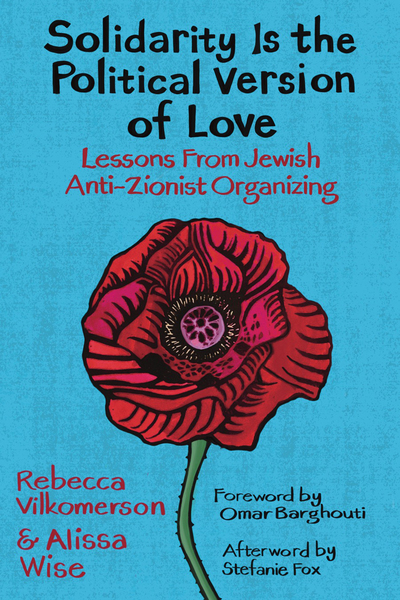
First of all, there wasn’t an organized left in the same way in this country. At the time I was also part of an anti-capitalist collective and people weren’t talking about socialism in the same way. There was no DSA. [Democratic Socialists of America] I just think it’s important to remember that the left was at one of its lowest ebbs ever in in this country in the late 90s and early 2000s.
There were Jewish peace groups that supported a two-state solution, but it was very, very different than it is today. I think it’s important to remember from a historical point of view, just how much things have shifted.
I’m saying all that at the beginning to say that I don’t think JVP changed its politics fundamentally, but they really evolved to match external circumstances. They evolved based on what was happening in Palestine, Israel, and the United States.
It was always left organization. It was founded by leftists. The first committee I was part of, when I was a member and not on staff yet, was called Stop Military Aid to Israel. We were doing a campaign against Caterpillar and that actually predated even the BDS call. I wouldn’t say JVP wasn’t on the left at the time, but it definitely had a much larger range of political identity within it and that definitely ranged from liberal Zionist to anti-Zionist.
A lot of things happened over time time to change that. I mentioned the Second Intifada, which predates the period that we’re talking about in the book, but the you had the assault on Gaza in 2009. You had 2012, 2014. Every couple years there was an assault on Gaza. The situation in the West Bank was also intensifying. Various political movements in the United States were also changing, but I think the most important thing that happened was that JVP started making very specific and profound partnerships with Palestinians and with Palestinian organizations.
I think that was very different than any other Jewish organization. We placed ourselves in community and in coalition and in partnership and in allyship with Palestinians. With most Jewish organizations, whether it was liberal Zionists or right-wing Zionists, their point of reference was always only the Jewish community. For JVP our reference was also Palestinians, Palestinian-Americans, and other communities. We had a web of interlocking relationships that we felt accountability to, and that was really, really important.
We had a long-standing relationship with Adalah-New York, and for a long time JVP didn’t endorse BDS. We endorsed BDS in 2015, but before then we were still doing the “boycott occupation” campaign. We were doing these partnerships with Adalah-New York, and they would always ask us to endorse their cultural boycott work and their broader boycott of Israel. However, because we had these guidelines that limited us to a boycott of the occupation, we always had to say no.
They never got mad at us and they didn’t stop their relationship with us. They kept on working with us whenever they could, but that experience was very agitational in a good way. We were disappointing our partners and we didn’t want to disappoint our partners. We wanted to be in full partnership with them and we wanted to be able to say Yes to them.
So a profound commitment to those relationships was incredibly important in helping us to make the big moves that we did, like endorsing BDS in 2015. It had not been done by any other Jewish organization of significant size. It might be hard to to remember even now, but at the time it took quite a bit of nerve. So I think that was that was really, really important too.
A number of other Jewish organizations emerged between 2010 and 2020 that ranged from J Street to IfNotNow. So JVP was taking more and more specific and sharp political positions from BDS to anti-Zionism, but they also weren’t the only game in town. If people felt uncomfortable with those positions they could find other places where they felt more at home.
One of the most important things, and we mention this in the book, is that when we moved leftward we didn’t lose a lot of people. I think that’s because we did a very good job with process and because it was an accurate reflection of our membership. Our membership was ready to, for example, endorse BDS and was ready to officially become anti-Zionist.
There’s a section in the book where you talk about the need to build a political home. Can you explain what you mean by that?
I think this is the most important lesson that we hope people will take away from the book.
For us the book has a dual purpose. We are obviously are very rooted in the movement for Palestinian freedom and also in a the leftist Jewish political present and future. But also we think there’s a lot lessons to be learned for other movements, our sibling movements, specifically movement that are trying to shift their communities.
One example is the group Hindus for Human Rights, who model themselves on JVP. They’re trying to organize their own community away from certain positions. That’s a specific kind of organizing that can be very hard and can be very lonely. It’s very important for organizers to create a place where people coming to the issue feel like they’re at home. Somewhere where you get a sense of community, where you get a sense of mutual support.
This work is very hard on a day-to-day basis and it’s very long-term work. It’s not the sort of thing that’s going to be solved in a day or decades even. You need to be able to create a place for people where they are are getting something for their whole selves that nourishes them for the struggle. I think the reason we knew that and did it instinctively is because we needed that.
Many Jewish people grow up in a community that’s very, very Zionist and that provides a lot of support and infrastructure, everything from Jewish day schools to Jewish summer camps to just growing up in a congregation that you see every week and you see it holidays.
If you turn to somewhere like JVP you might be excommunicated from that community or lose many of the connections and sense of belonging. That can be a very hard and very painful process. So for those people, you can’t ask them to go from something to nothing. They need a place where they can get a lot of what they used to get from those other communities.
If there was someone who felt alienated from Jewish community, which is a lot of people in JVP, if Jewish communal institutions did not welcome them either because of their politics or because they came from interfaith families or because they were queer or because they were Jews of color, to be able to create a sense of home for people when they didn’t have one inside of Jewish community is really powerful and really important.
Support for Israel among Jewish-Americans for Israel is still strong overall, but we do see shifts there and there is definitely a generational gap on this issue. Can you talk about that?
I’d start by saying I have two college-aged kids. I have one kid who just graduated from school and one who’s in college. I think one of the things that I feel really proud of is how easy it is now, and even natural it is no, to find an anti-Zionist Jewish community. I mean, obviously for my kids specifically, that wasn’t a hard thing, but I look at their friends and a lot of them are involved in groups like Students for Justice in Palestine (SJP) and we’re involved in the encampments this year. Just generally the norm among many, certainly not all, but a good chunk of the Jewish generation coming up is that they have the option to be part of an anti-Zionist Jewish community.
I feel like, to a large extent, JVP helped build that. When I first started in JVP, that was an extremely lonely position to take. If my co-author Rabbi Alissa Wise were here right now she would talk about her experience, for example, in rabbinical school and how isolated she was and how she had to fight every step of the way. So I feel really proud that JVP made a huge contribution to making it possible for young people to have a community with other Jewish anti-Zionists and other non-Jewish anti-Zionists and to feel a sense of belonging.
JVP is now old enough to have gone through many different generations. The founding generation was a group of people who were leftists that had a lot of experience in other movements and I think came with a very left perspective on the world and analysis of the world. Many of them were doing the work specifically from the perspective of Jewish identity for the first time.
Then there was another generation that came in around 2014/2015. In that post-2009 moment after that war on Gaza, who came in specifically because of their perspective on Palestine. They were kind of brought into broader left politics through that work but didn’t necessarily come in with that perspective. One of the things that was interesting about that period in JVP’s life is that I remember noticing some of the strongest anti-Zionist voices at that time were folks who had a more observant Jewish practice.
These people didn’t need Israel in order to feel Jewish because they had a very strong Jewish ritual practice. So their their Zionism wasn’t connected. They didn’t need Zionism in order to feel Jewish. I think a lot of Jewish people are brought up in this country and their Jewish education is basically based around the Holocaust and Israel. Disentangling from Israel felt like disentangling from your core identity. That has been one of the things that has been very hard for many younger people as they come up into the movement, but more observant Jews don’t have that because they already have a rich spiritual practice.
During Black Lives Matter we saw a lot of people joining the organization through the lens of racial justice. They had an understanding of white supremacy, an understanding of settler colonialism. They had learned some of that from indigenous movements because they had supported the Standing Rock activism. They’d been supporting the Movement for Black Lives. They had been part of those movements. I think in the time since Black Lives Matter, being anti-Zionist has become part of a broader sense of being a person on the left. If you support universal health care and are working against fascism in this country, then you’re probably likely to also have an anti-Zionist position on Palestine.
In the foreword to the book, Omar Barghouti references JVP’s theory of change. He says, “it constitutes a critical mass of American Jews who collectively serve as a counterweight to the various legacy Jewish institutions.” I wanted to talk about those institutions, where there really hasn’t been a shift. Why do you think so many mainstream Jewish organizations remain tethered to Israel? I’m also wondering what you think about how those organizations have reacted to the current assault on Gaza.
I hardly have words for how horrific the responses from these institutions have been on Gaza. Even as someone who has been pretty enraged for a couple of decades at these organizations, I still feel pretty shocked at their willingness to condone genocide, to support genocide, and to excuse genocide. Also, their willingness to have this assault on Palestinian lives waged in our names. I think it’s incredibly dangerous and just appalling. I just don’t even have strong enough words.
Disappointing is the wrong word because I didn’t have any expectations of them, but I still think there’s a part of me that believes as Jewish people you can’t allow a genocide to happen in your name. I find it shocking that they are they are willing to do that.
I’m probably the wrong person to ask, why are they so tethered to Israel? I have no idea of their insights or what’s going on there. I’m not familiar with the inner workings of these groups, but I think obviously donors are a part of it. I think to a large extent they are tethered to the positions that the the donor class demands of them.
Of course I also recognize that there are a lot of true believers in these positions and that’s even more depressing honestly. I think the machinery of indoctrination that has been developed honed over many, many, decades is part of it. The summer camps, the free trips to Israel, the ways young student leaders are picked off and developed by AIPAC, for example, as leaders. All of those things have been very effective and I think the most depressing part of it all is that, in a lot of cases, the sense of trauma and fear that we were taught in post-Holocaust generations as part of our Jewish identity is really being exploited and abused to justify inexcusable acts.
Since October 7th, we’ve seen many Jewish activists involved in the protests. In fact, we’ve seen many Jewish activists and progressive Jewish groups lead and organize some of the biggest protests and actions. How do you balance drawing attention to these important shifts within the Jewish community while making sure the focus remains on the suffering of Palestinians? I am wondering if that is challenge and if you have any reflections on it.
That is a challenge and it’s a great question.
I will also emphasize that it’s not a new question. I think it was also a question during the period of 2010 to 2020, that the book addresses.
We finished writing the book in September of 2023, not imagining what was about to happen, but it does feel like an important grounding to understand that these patterns have existed for a long time. It is a very sensitive topic and one that JVP had to think about a lot during the time that Alissa and I were in leadership. I think that during my time in leadership, we sometimes got it right and we sometimes got it wrong. The important thing was to be in relationship with Palestinian organizations and be willing to self-reflect and recalibrate.
There were times when we got hard feedback from partners about how we hadn’t thought through how we might have been centering ourselves, instead of being careful about how that looked in the context of the larger struggle. When that happened, we heard from our partners and hopefully learned from our experiences. That doesn’t mean that you get it exactly right the next time. I think JVP now is doing a really terrific job of being in consultation and partnership with Palestinian partners and figuring out where our role is.
I’m still a very active and proud member of the JVP New York City chapter, so I still feel entitled to say our, but I think the national leadership is being very sensitive to those questions.
I certainly think that JVP has a role in talking to Jewish audiences, for sure. I think that’s a very specific role that we play and that no one else within the movement should have to play. We’re very aware of the ways that accusations of antisemitism are being used to repress the conversation about the genocide and so there can be times when a Jewish voice is helpful in having that conversation about why it’s not antisemitic to speak out against the genocide. For example, it can be useful for white Jews to talk to other white people about how those accusations are used.
I think recognizing that JVP has one role within a much broader movement and that we are not always supposed to be at the forefront is also important.
In the first weeks of the genocide I think JVP’s actions helped make it possible to talk about ceasefire, which in the first few weeks was very hard for some to say. Also to use the word genocide. I think JVP’s early actions helped complicate the idea that the Jewish community was united around the assault on Gaza. Those are examples where I feel we did it right, of course there are other times when we haven’t.
It’s a discernment process and a consultation process and a willingness to say when we get it wrong process.
There was a recent Biden interview where he said something that he’s said multiple times before. He said he considers himself a Zionist and that you don’t have to be Jewish to be one. He’s also repeatedly said that if Israel didn’t exist, every Jewish person in the world would be unsafe. This is the Democratic President. The Republicans are often even more extreme on this issue.
I am wondering how you go about this task of kind of decoupling Zionism from Judaism, when it’s so entrenched with so many people and so entrenched in the public consciousness.
First of all, I think Biden himself is reminding us that there are many Zionists who are not Jewish. Christian Zionism actually dwarfs Jewish Zionism, certainly in its size and scope and certainly in its proximity to power in the sense that it’s one of the core constituencies of the Republican Party.
Christian evangelical Zionism is also extremely antisemitic and they really see Jews as a means to end for the Second Coming. Jews do not come out well in that scenario. So in that sense, Biden’s comments are a helpful reminder.
I find Biden’s statement that no Jew in the world would be safe without Israel to be both antisemitic and untrue. Israel makes the world more unsafe for Jews around the world. I also think Biden’s saying, not so subtly, that Jews in the United States somehow belong more to Israel than they do to the United States. I think this an extremely dangerous and untenable idea and completely unacceptable in any of our political leaders.
The fact that these perceptions still exist is something serious that we need to contend with. To a certain extent it goes back to your previous question about JVP’s role. It’s very important to complicate these questions by having a strong, public, Jewish face saying, we’re against the genocide, we’re against antisemitism being weaponized to justify a genocide, and we need to call attention to Islamophobia and anti-Arab racism that is so entrenched that people can barely see the humanity of Palestinians, where Gaza is being viciously destroyed as we speak.
The fact that the President of the United States can make these statements just shows how important it is. I think that the greater point is that I see this as a moment of real rupture, in terms of the meaning of being a Jewish person. I think that building a new Judaism and a new Jewishness out of the ashes of this moment is important.
This also goes back to your question about Jewish institutions. think they’ve totally delegitimized themselves. They never had any right to represent themselves as speaking for the Jewish community in the United States. They have morally and ethically completely bankrupted themselves in the last ten months to the extent to that was not already true. It is absolutely true now.
I think the only piece of hope that I can take from that is that there could be new forms of Jewishness, new institutions, new ways of being, new ways of embracing a Judaism where genocide is not accepted.
I want to be very clear. I don’t think that genocide was integral to Jewishness for 95% of its history, but in this particular moment in history, this relatively short moment in history which has only lasted a few decades since the birth of Israel, there’s been this idea that Israel is the center of Jewish life. We now have an opportunity and an obligation to decouple that and to find a way for Jewish life to flourish apart from Zionism.
